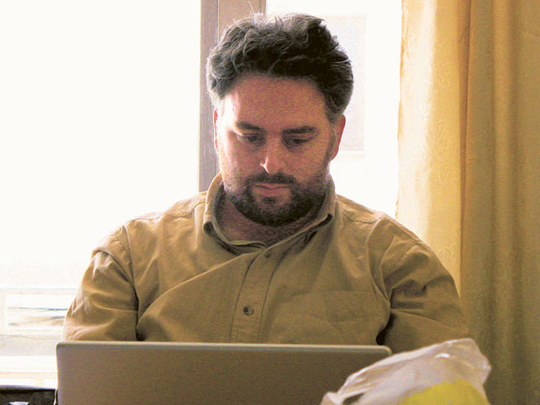
After five years of research, hundreds of interviews and several investigative trips to Iraq and Afghanistan, Joshua E.S. Phillips shed light on one of the most controversial topics in existence: detainee abuse and torture by American forces.
The elements that pulled his book's focus into view "were a confluence of questions being asked after Abu Ghraib: ‘how was it that American soldiers were doing this kind of thing, where did that come from', was the impetus there, and then I begin noticing some dimensions of the issue that weren't being reported, such as problems that soldiers were faced with while trying to report abuse, being ignored, discouraged and in some cases even threatened," he told Weekend Review during a visit to Dubai.
None of Us Were Like This Before examines why US forces turned to torture in interrogation and how this came about.
Phillips is a New York-based journalist who wrote a cover story for the Washington Post about torture victims from El Salvador (2003). The El Salvador Generals he spoke to tried to make excuses for their use of torture, as it was for the "preservation of democracy".
After the terrorist attacks of September 11, debates surrounding torture and how it was used to "break" terror suspects increased, Phillips said. "I was hearing a lot of the same rhetoric that I'd heard from the El Salvador Generals being echoed by senior administration officials, which sparked my interest in doing initial research into the book."
In 2005, Phillips started interviewing former detainees in the Middle East and then two years later in Afghanistan — including community leaders, translators, former soldiers, senior military and intelligence officials.
Having been a foreign correspondent in the Middle East, Afghanistan, Indonesia, Cambodia and South East Asia, he knew that the story would be big. He realised that it was a book and it was "too massive" to be a magazine article.
"There was an important story," he said, "not because it was gruesome but because of the ways in which it happened."
These "ways" were signed Pentagon memos authorising harsh interrogations, officers looking the other way and ignoring abuse, and actually encouraging detainee abuse.
Before starting research on None of Us Were Like This Before, Phillips made a radio documentary that focused on a battalion which served in Iraq.
The American Radio Works documentary looked at the life of Sergeant Adam Gray, who committed suicide after being involved in detainee abuse while serving a term in the country. What started out as one story-thread about the particular battalion grew to involve other threads during his research.
Last year, the journalist won the Alfred I DuPont-Columbia University award for excellence in broadcast journalism for his radio work.
For the author, his work is important in understanding how US forces turned to torture, for reasons that "include but are not exclusive to interrogation".
"I think that's an important component — that they didn't just turn to it for purposes of interrogation," he said.
Understanding the "grave, unrecognised costs" of torture and how they have affected the counter-insurgency policies of the US remains an ill-understood problem, according to Phillips.
"There's a belief that the US didn't use serious techniques. The detainees were often abused or tortured with techniques that didn't leave marks; and that inflicts its own kind of trauma," he said.
While there was some high-level governmental sanctioning of the abuses, "even the most seasoned, highly regarded senior military and intelligence professionals have views against it", he said.
Although public opinion was generally set against torture, even after September 11, opinion polls show "there's increased public support for torture", Phillips said.
"Tactically it's a mess … on one hand you have trained professionals saying ‘don't use torture', then you have public sentiment going the other way.
"I think we need to harmonise the people who are feeling like it's justified and necessary and effective, with an understanding of how ineffective, self-destructive it is," he said.
Exacting torture during interrogations also burnt a system of cooperation with local allies, which Phillips investigated during his time in the Middle East. Having written the book, to acknowledge "the pain all of us are feeling, as citizens, as people who are next to the soldiers, to detainees … everyone will suffer as a result of this experience," he said.
Writing took its toll on the writer. "This book killed me. It wiped me out financially. I accept that, I mean, I made my bed ...," he said. "But to me, the story was so important, I had to do it."








